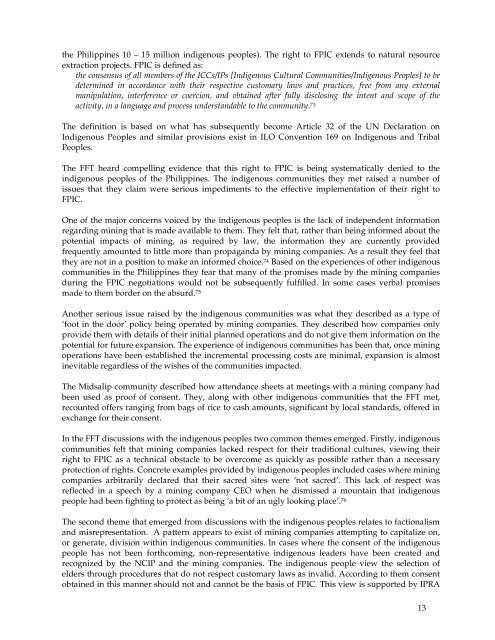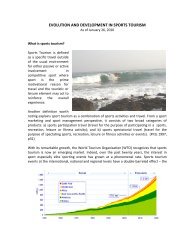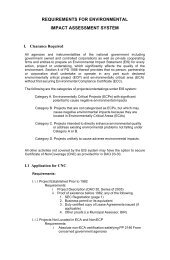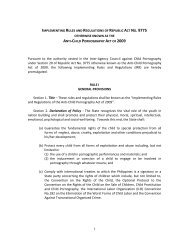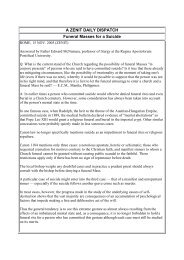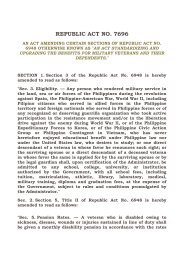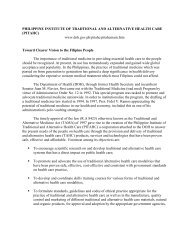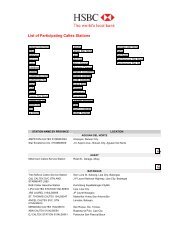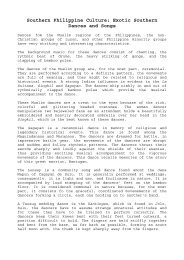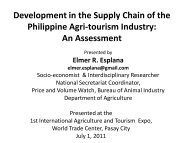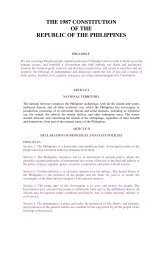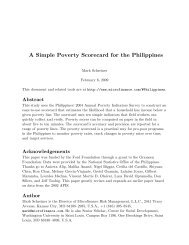Mining in the Philippines - Concerns and Conflicts
Mining in the Philippines - Concerns and Conflicts
Mining in the Philippines - Concerns and Conflicts
You also want an ePaper? Increase the reach of your titles
YUMPU automatically turns print PDFs into web optimized ePapers that Google loves.
<strong>the</strong> Philipp<strong>in</strong>es 10 – 15 million <strong>in</strong>digenous peoples). The right to FPIC extends to natural resource<br />
extraction projects. FPIC is def<strong>in</strong>ed as:<br />
<strong>the</strong> consensus of all members of <strong>the</strong> ICCs/IPs [Indigenous Cultural Communities/Indigenous Peoples] to be<br />
determ<strong>in</strong>ed <strong>in</strong> accordance with <strong>the</strong>ir respective customary laws <strong>and</strong> practices, free from any external<br />
manipulation, <strong>in</strong>terference or coercion, <strong>and</strong> obta<strong>in</strong>ed after fully disclos<strong>in</strong>g <strong>the</strong> <strong>in</strong>tent <strong>and</strong> scope of <strong>the</strong><br />
activity, <strong>in</strong> a language <strong>and</strong> process underst<strong>and</strong>able to <strong>the</strong> community. 73<br />
The def<strong>in</strong>ition is based on what has subsequently become Article 32 of <strong>the</strong> UN Declaration on<br />
Indigenous Peoples <strong>and</strong> similar provisions exist <strong>in</strong> ILO Convention 169 on Indigenous <strong>and</strong> Tribal<br />
Peoples.<br />
The FFT heard compell<strong>in</strong>g evidence that this right to FPIC is be<strong>in</strong>g systematically denied to <strong>the</strong><br />
<strong>in</strong>digenous peoples of <strong>the</strong> Philipp<strong>in</strong>es. The <strong>in</strong>digenous communities <strong>the</strong>y met raised a number of<br />
issues that <strong>the</strong>y claim were serious impediments to <strong>the</strong> effective implementation of <strong>the</strong>ir right to<br />
FPIC.<br />
One of <strong>the</strong> major concerns voiced by <strong>the</strong> <strong>in</strong>digenous peoples is <strong>the</strong> lack of <strong>in</strong>dependent <strong>in</strong>formation<br />
regard<strong>in</strong>g m<strong>in</strong><strong>in</strong>g that is made available to <strong>the</strong>m. They felt that, ra<strong>the</strong>r than be<strong>in</strong>g <strong>in</strong>formed about <strong>the</strong><br />
potential impacts of m<strong>in</strong><strong>in</strong>g, as required by law, <strong>the</strong> <strong>in</strong>formation <strong>the</strong>y are currently provided<br />
frequently amounted to little more than propag<strong>and</strong>a by m<strong>in</strong><strong>in</strong>g companies. As a result <strong>the</strong>y feel that<br />
<strong>the</strong>y are not <strong>in</strong> a position to make an <strong>in</strong>formed choice. 74 Based on <strong>the</strong> experiences of o<strong>the</strong>r <strong>in</strong>digenous<br />
communities <strong>in</strong> <strong>the</strong> Philipp<strong>in</strong>es <strong>the</strong>y fear that many of <strong>the</strong> promises made by <strong>the</strong> m<strong>in</strong><strong>in</strong>g companies<br />
dur<strong>in</strong>g <strong>the</strong> FPIC negotiations would not be subsequently fulfilled. In some cases verbal promises<br />
made to <strong>the</strong>m border on <strong>the</strong> absurd. 75<br />
Ano<strong>the</strong>r serious issue raised by <strong>the</strong> <strong>in</strong>digenous communities was what <strong>the</strong>y described as a type of<br />
‘foot <strong>in</strong> <strong>the</strong> door’ policy be<strong>in</strong>g operated by m<strong>in</strong><strong>in</strong>g companies. They described how companies only<br />
provide <strong>the</strong>m with details of <strong>the</strong>ir <strong>in</strong>itial planned operations <strong>and</strong> do not give <strong>the</strong>m <strong>in</strong>formation on <strong>the</strong><br />
potential for future expansion. The experience of <strong>in</strong>digenous communities has been that, once m<strong>in</strong><strong>in</strong>g<br />
operations have been established <strong>the</strong> <strong>in</strong>cremental process<strong>in</strong>g costs are m<strong>in</strong>imal, expansion is almost<br />
<strong>in</strong>evitable regardless of <strong>the</strong> wishes of <strong>the</strong> communities impacted.<br />
The Midsalip community described how attendance sheets at meet<strong>in</strong>gs with a m<strong>in</strong><strong>in</strong>g company had<br />
been used as proof of consent. They, along with o<strong>the</strong>r <strong>in</strong>digenous communities that <strong>the</strong> FFT met,<br />
recounted offers rang<strong>in</strong>g from bags of rice to cash amounts, significant by local st<strong>and</strong>ards, offered <strong>in</strong><br />
exchange for <strong>the</strong>ir consent.<br />
In <strong>the</strong> FFT discussions with <strong>the</strong> <strong>in</strong>digenous peoples two common <strong>the</strong>mes emerged. Firstly, <strong>in</strong>digenous<br />
communities felt that m<strong>in</strong><strong>in</strong>g companies lacked respect for <strong>the</strong>ir traditional cultures, view<strong>in</strong>g <strong>the</strong>ir<br />
right to FPIC as a technical obstacle to be overcome as quickly as possible ra<strong>the</strong>r than a necessary<br />
protection of rights. Concrete examples provided by <strong>in</strong>digenous peoples <strong>in</strong>cluded cases where m<strong>in</strong><strong>in</strong>g<br />
companies arbitrarily declared that <strong>the</strong>ir sacred sites were ‘not sacred’. This lack of respect was<br />
reflected <strong>in</strong> a speech by a m<strong>in</strong><strong>in</strong>g company CEO when he dismissed a mounta<strong>in</strong> that <strong>in</strong>digenous<br />
people had been fight<strong>in</strong>g to protect as be<strong>in</strong>g ‘a bit of an ugly look<strong>in</strong>g place’. 76<br />
The second <strong>the</strong>me that emerged from discussions with <strong>the</strong> <strong>in</strong>digenous peoples relates to factionalism<br />
<strong>and</strong> misrepresentation. A pattern appears to exist of m<strong>in</strong><strong>in</strong>g companies attempt<strong>in</strong>g to capitalize on,<br />
or generate, division with<strong>in</strong> <strong>in</strong>digenous communities. In cases where <strong>the</strong> consent of <strong>the</strong> <strong>in</strong>digenous<br />
people has not been forthcom<strong>in</strong>g, non-representative <strong>in</strong>digenous leaders have been created <strong>and</strong><br />
recognized by <strong>the</strong> NCIP <strong>and</strong> <strong>the</strong> m<strong>in</strong><strong>in</strong>g companies. The <strong>in</strong>digenous people view <strong>the</strong> selection of<br />
elders through procedures that do not respect customary laws as <strong>in</strong>valid. Accord<strong>in</strong>g to <strong>the</strong>m consent<br />
obta<strong>in</strong>ed <strong>in</strong> this manner should not <strong>and</strong> cannot be <strong>the</strong> basis of FPIC. This view is supported by IPRA<br />
13


